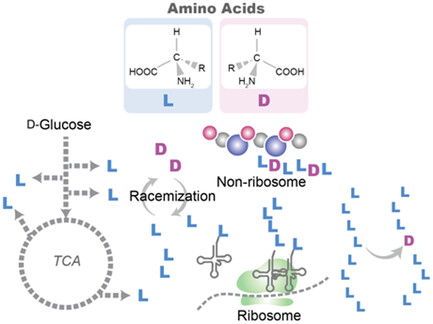RESEARCH
[Publication] Mammalian Tolerance to Amino Acid Heterochirality
July 22, 2025

Organisms preferentially use l-amino acids (l-AAs). However, de novo synthesized l-AAs are in part converted to d-AAs. The ribosome has a robust system to use l-AAs for protein synthesis, whereas non-ribosomal synthesis can also use d-AAs. Furthermor
Credits: 2025 Sakiko Taniguchi et al.
Co-authored by Bio2Q and Keio University researchers, this Review explores the role of D-amino acids in mammals, highlighting their functional relevance despite the body’s predominant use of L-enantiomers. The authors outline how enzymatic control, microbial interactions, and tissue-level adaptations allow mammals to maintain control over environments with mixed amino acid chirality.
| Title | Mammalian Tolerance to Amino Acid Heterochirality |
|---|---|
| Authors | Sakiko Taniguchi [1],[2], Kenichiro Adachi [1], Xuan Tran [1],[3], Masataka Suzuki [1],[4], Jumpei Sasabe [5],[6], |
| Short Description | This review article, co-authored by Bio2Q and Keio University researchers, examines how mammals tolerate and utilize D-amino acids, once thought to be inert or even harmful byproducts of metabolism. While systemic amino acid metabolism strongly favors L-enantiomers, this work highlights the active roles that D-amino acids play in the brain, endocrine system, immune signaling, and in the gut epithelium. The authors integrate findings from across disciplines, including microbiome science, to explore how enzymatic degradation, renal filtration, and cellular proofreading mechanisms coordinate to maintain overall homochirality, while also supporting functional heterochirality. This Review works to reframe D-amino acids not as metabolic errors, but as selectively integrated components of mammalian physiology, offering a foundation for future research into their regulatory and therapeutic potential. |
| DOI | https://doi.org/10.1016/j.coi.2025.102568. |
| Journal | ChemBioChem |
| Vol/Num/Page | Volume 26, Issue 13, e202500273 |
| Publication Date | 2025 June 3. |
Affiliations:
[1] Department of Pharmacology, Keio University School of Medicine, 35 Shinanomachi, Shinjuku-ku, Tokyo, 160-8582 Japan
[2] Research Fellow of Japan Society for the Promotion of Science, 35 Shinanomachi, Shinjuku-ku, Tokyo, 160-8582 Japan
[3] Department of Plant Physiology, Eberhard Karls Universitat Tubingen, Auf der Morgenstalle 32, 72076 Tubingen, Germany
[4] Department of Medicine, Harvard Medical School, 181 Longwood Avenue, Boston, MA, 02115 USA
[5] Laboratory of Electron Microscope and Chiral Medical Biology, Keio University School of Medicine, 35 Shinanomachi, Shinjuku-ku, Tokyo, 160-8582 Japan
[6] WPI-Bio2Q, Keio University, 35 Shinanomachi, Shinjuku-ku, Tokyo, 160-8582 Japan
More Bio2Q News
【2/25Seminar】WPI-Bio2Q Open Seminar: Andrew Wray, PhD
Keio University Human Biology-Microbiome-Quantum Research Center (WPI-Bio2Q) will hold a seminar as follows. This is an event for faculty, ...
Two New Titles Released in the “Booklets Series for Young Readers” : Issue 09 (T...
The Digital Booklet Series for Young Readers, which introduces research activities at Bio2Q, has added two new issues. Issue 09 features ...
WPI-Bio2Q Newsletter "Bio2Q Connect" Vol.2, Issue 13 Released
WPI-Bio2Q has published the latest issue of its newsletter, “Bio2Q Connect” (Vol. 2, Issue 13, January 29, 2026). This issue covers a broad ...
Open Call: Postdoctoral Fellow for Professor Nadinath Nillegoda’s Lab
Prof. Nadinath Nillegoda, specializing in proteostasis and cell repair, is currently hiring a postdoctoral fellow. We are looking for appli...
【CHO School Series】Exploring the Frontiers of Life Science: A Special 3-Part Onl...
Keio University Human Biology-Microbiome-Quantum Research Center (WPI-Bio2Q) in collaboration with Knowledge Capital, will host a three-par...









2-1.png)


